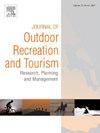保护消费:生态旅游者为保护森林而购买当地产品的决定因素
IF 4.4
3区 管理学
Q1 HOSPITALITY, LEISURE, SPORT & TOURISM
Journal of Outdoor Recreation and Tourism-Research Planning and Management
Pub Date : 2025-07-28
DOI:10.1016/j.jort.2025.100935
引用次数: 0
摘要
生态旅游在减少当地社区生计对森林资源的依赖方面具有巨大潜力,同时通过购买当地生产的商品,特别是在受保护的森林地区,直接促进森林保护。了解影响游客购买这些产品意愿的因素,以及他们的实际购买行为,对于促进可持续消费模式至关重要。本研究通过将计划行为理论扩展到包含两个额外变量:购买对保护和环境知识的感知影响,解决了一个关键的研究空白。采用结构化问卷法对445名生态旅游者进行数据收集,并采用结构方程模型进行分析。这些附加变量的加入增强了模型对意图的解释能力,从0.48增加到0.65,并将其对行为的预测精度从0.43提高到0.50。假设检验证实,游客态度、感知社会规范、感知行为控制、感知环境知识和感知购买保护影响对其行为意图有显著的正向影响,而行为意图又对购买行为产生正向影响。然而,调查结果也揭示了意图和实际行为之间的差距,因为并非所有表达的购买本地产品的意图都转化为行动。这些见解为管理和政策提供了有价值的启示。加强游客的环境知识,培养积极的态度,确保当地产品的可用性,增强对其保护影响的信心,可以有效地鼓励购买意愿和实际行为,最终支持可持续生态旅游实践。本文章由计算机程序翻译,如有差异,请以英文原文为准。

Consumption for conservation: determinants of purchasing local products by ecotourists to conserving protected forests
Ecotourism holds significant potential to reduce local communities' dependence on forest resources for their livelihoods while directly contributing to forest conservation by purchase of locally produced goods, particularly in protected forest areas. Understanding the factors that shape tourists' intentions to buy these products, as well as their actual purchasing behaviors, is crucial for promoting sustainable consumption patterns. This study addresses a critical research gap by extending the theory of planned behavior to incorporate two additional variables: the perceived impact of purchasing on conservation and environmental knowledge. Data were collected from 445 ecotourists through a structured questionnaire and analyzed using structural equation modeling. The inclusion of these additional variables enhanced the model's explanatory power for intention, increasing from 0.48 to 0.65, and improved its predictive accuracy for behavior from 0.43 to 0.50. Hypothesis testing confirmed that tourists' attitudes, perceived social norms, perceived behavioral control, environmental knowledge, and the perceived conservation impact of purchasing all had significant positive effects on their behavioral intentions, which, in turn, positively influenced purchasing behavior. However, the findings also revealed a gap between intention and actual behavior, as not all expressed intentions to buy local products translated into action. These insights offer valuable implications for both management and policy. Strengthening tourists' environmental knowledge, fostering positive attitudes, ensuring the availability of local products, and enhancing confidence in their conservation impact can effectively encourage both purchasing intentions and actual behaviors, ultimately supporting sustainable ecotourism practices.
求助全文
通过发布文献求助,成功后即可免费获取论文全文。
去求助
来源期刊

Journal of Outdoor Recreation and Tourism-Research Planning and Management
HOSPITALITY, LEISURE, SPORT & TOURISM-
CiteScore
6.70
自引率
5.30%
发文量
84
期刊介绍:
Journal of Outdoor Recreation and Tourism offers a dedicated outlet for research relevant to social sciences and natural resources. The journal publishes peer reviewed original research on all aspects of outdoor recreation planning and management, covering the entire spectrum of settings from wilderness to urban outdoor recreation opportunities. It also focuses on new products and findings in nature based tourism and park management. JORT is an interdisciplinary and transdisciplinary journal, articles may focus on any aspect of theory, method, or concept of outdoor recreation research, planning or management, and interdisciplinary work is especially welcome, and may be of a theoretical and/or a case study nature. Depending on the topic of investigation, articles may be positioned within one academic discipline, or draw from several disciplines in an integrative manner, with overarching relevance to social sciences and natural resources. JORT is international in scope and attracts scholars from all reaches of the world to facilitate the exchange of ideas. As such, the journal enhances understanding of scientific knowledge, empirical results, and practitioners'' needs. Therefore in JORT each article is accompanied by an executive summary, written by the editors or authors, highlighting the planning and management relevant aspects of the article.
 求助内容:
求助内容: 应助结果提醒方式:
应助结果提醒方式:


